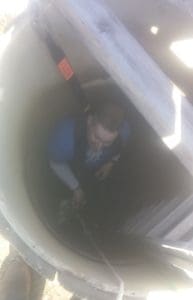
Travis in 60-Foot Shallow Well
Did you know shallow wells provide clean and safe drinking water to over a billion people worldwide? These wells offer numerous benefits, from easy access to shallow aquifers and deepwater fields to cost-effective maintenance. Shallow well systems are efficient and environmentally friendly, making them a sustainable choice for homeowners needing reliable water sources. Discover how these wells can significantly impact water accessibility and quality for many individuals.
Understanding Shallow Wells from Nanjemoy to St. Mary’s City
Basics Explained
Shallow wells are typically less than 100 feet deep and draw water from aquifers near the surface. They are cost-effective and easy to maintain.
They rely on natural filtration processes as the water seeps through layers of soil and rock in deep wells, providing relatively clean water.
Shallow wells suit small-scale water needs like household use, livestock, and irrigation in rural areas.
Shallow vs. Deep Wells
Compared to deep wells, shallow wells are less expensive to construct and require minimal equipment for installation.
However, shallow wells are more susceptible to contamination from surface pollutants due to their proximity to the ground.
Deep wells, on the other hand, tap into deeper aquifers and provide a more reliable water supply, but they have higher installation costs.
Key Components
The main components of a shallow well system include a casing, which prevents the well from collapsing, and a screen pipe that filters out debris.
A submersible pump draws water from the well, while a well cap protects the opening from contaminants.
Regular maintenance of these components is crucial to ensure the well continues to provide clean and safe water.
Regulations Overview
Regulations for shallow wells vary by region but typically involve well construction, location, and testing guidelines.
Permits may be required in some areas before drilling a shallow well to ensure compliance with local regulations.
Following these regulations is essential to preventing groundwater contamination and protecting the health of those who use the water.
Advantages of Water Extraction
Cost Benefits
Shallow wells offer significant cost benefits compared to deeper wells, making them a budget-friendly option for water extraction. The initial installation costs are lower due to the shallower depth required, reducing overall expenses.
Moreover, shallow wells require minimal maintenance and less frequent professional servicing. This affordability makes shallow wells a practical choice for homeowners looking to save money on water extraction solutions.
Easy Maintenance from Nanjemoy to St. Mary’s City
One of the key advantages of shallow wells is their ease of maintenance. Homeowners can perform routine checks and basic maintenance tasks without specialized equipment or professional assistance. This convenience saves both time and money in the long run.
Regular maintenance includes cleaning the well casing and ensuring proper drainage to prevent blockages. By staying proactive with maintenance, homeowners can prolong the lifespan of their shallow well system and provide a consistent water supply.
Accessibility for Homes
Shallow wells are highly accessible for homes, making them famous for residential properties. Their relatively shallow depth allows for easier installation near homes, providing convenient access to clean and reliable water sources.
The compact size of shallow wells makes them ideal for properties with limited space. Whether in urban or rural areas, homeowners can benefit from shallow wells’ accessibility to meet their daily water needs.
- Ideal for residential properties
- Convenient access to clean water
Pump Efficiency
Shallow wells are known for their pump efficiency, allowing for quick and efficient water extraction. The shorter distance between the surface and the water table causes the pump to work less, leading to higher efficiency and reduced energy consumption.
With proper pump selection and maintenance, homeowners can optimize the performance of their shallow well system. This efficiency ensures a steady water supply and reduces operational costs over time.
Environmental Benefits
Less Surface Contamination
Shallow well systems help prevent surface contamination by drawing water from underground aquifers. This process reduces the risk of pollutants seeping into the water supply.
Moreover, shallow wells have a smaller surface area exposed to potential contaminants, minimizing the chances of pollution.
Groundwater Pollution Reduction
By extracting water from shallow depths, shallow wells contribute to reducing groundwater pollution. This method taps into cleaner water sources, lessening the impact of human activities on groundwater quality.
The shorter distance that water travels from a shallow well to the surface decreases the likelihood of contamination.
Eco-friendly Pump Options
Eco-friendly pump options, such as solar-powered pumps, are famous for shallow well systems. These pumps rely on renewable energy sources, reducing reliance on electricity and lowering carbon emissions.
Furthermore, these pumps require minimal maintenance and have a longer lifespan, making them cost-effective and environmentally sustainable.
Practical Aspects
Pump Types
Pumps play a crucial role in extracting water from shallow wells. Centrifugal pumps are commonly used for their efficiency and ability to handle sandy water. Jet pumps, however, are suitable for wells with a depth of 25 feet or less.
- Centrifugal pumps are efficient and reliable.
- Jet pumps are ideal for shallow wells with limited depth.
Well Depth
Shallow wells are typically dug between 25 to 50 feet deep to access groundwater. This depth ensures a sustainable water supply while being cost-effective to construct and maintain.
- Shallow well depths range from 25 to 50 feet.
- Optimal depth balances water accessibility and construction costs.
Casing Diameter
The casing diameter of shallow wells is usually 4 to 6 inches. This diameter provides structural integrity to the well, preventing collapses and ensuring efficient water extraction.
- Casing diameters range from 4 to 6 inches for stability.
- Larger diameters enhance water flow and well durability.
Suitability and Applications
Residential Use
Shallow wells are ideal for residential use due to their easy installation and affordability. They provide quick access to water for household needs like drinking, cooking, and cleaning, and the shallow depth makes maintenance and repairs convenient for homeowners.
- Quick access to water
- Easy installation
- Convenient maintenance
Agricultural Needs
Shallow wells are beneficial for agricultural purposes, as they can provide irrigation water for crops. Farmers can easily access water to water their fields, especially when water sources are scarce. Shallow wells are cost-effective for small-scale farming operations.
- Irrigation water supply
- Accessible water source
- Cost-effective for farmers
Emergency Water Supply
Shallow wells serve as reliable sources of emergency water supply during emergencies such as natural disasters or infrastructure failures. Communities can depend on these wells when other sources are compromised. The shallow depth allows for quick deployment of emergency response measures.
- Reliable water supply
- Drinking water during emergencies
- Quick deployment of response measures
Efficiency Factors
Pump Location Impact
Installing the pump closer to the water level in a shallow well enhances efficiency. Placing the pump near the water source reduces the distance the water needs to travel, improving overall performance. This setup minimizes energy consumption and ensures a consistent water supply.
In contrast, positioning the pump at a higher point in the well can decrease efficiency. The pump has to work harder to draw water from deeper levels, resulting in higher energy usage. Therefore, optimal pump placement is crucial for maximizing the well’s productivity.
Average Well Depth Importance
The depth of a shallow well plays a significant role in its functionality. Shallow wells typically range from 10 to 30 feet deep, making them ideal for residential use. Their shallowness allows for easier access to water, simplifying maintenance and repairs when needed.
Moreover, the average well depth directly impacts water quality. Deeper wells are more susceptible to contamination from pollutants seeping through the ground. In contrast, shallow wells are less prone to contamination due to their shallower depth, ensuring cleaner and safer drinking water.
Casing Significance
The casing of a shallow well serves as a protective barrier between the wellbore and surrounding soil or rock formations. Casing prevents collapse and maintains the integrity of the well structure. It also helps prevent surface contaminants from entering the well, safeguarding the water supply.
Casing materials like PVC or steel contribute to the well’s overall durability. PVC casings are corrosion-resistant and cost-effective, while steel casings offer added strength and longevity. Proper casing installation is essential for ensuring the longevity and efficiency of a shallow well.
Cost and Longevity
Installation Costs
Installing a shallow well typically costs less than drilling it, making it a budget-friendly option. The process involves digging a hole around 25 feet deep, which reduces labor and equipment expenses. Moreover, the materials required for a shallow well setup are generally more affordable than deep well systems.
- Lower initial investment
- Reduced labor and equipment costs
- Affordable materials needed
Maintenance Expenses
Shallow wells are known for their minimal maintenance requirements, translating to long-term cost savings. Routine checks on the pump, casing, and water quality are usually sufficient to keep the system running smoothly. Any repairs or replacements needed for shallow wells tend to be less complex and costly than those required for deep wells.
- Minimal maintenance needs
- Routine checks ensure smooth operation.
- Less expensive repairs and replacements
Well Lifespan
The lifespan of a shallow well is influenced by various factors such as water quality, usage, and maintenance practices. A well-maintained shallow well can last several decades, providing a reliable water source for households or small-scale agricultural operations. Regular inspections and upkeep can significantly extend the lifespan of a shallow well system.
- Influenced by water quality and maintenance
- It can last for several decades.
- Regular inspections prolong the lifespan.
Closing Thoughts
You’ve now explored the world of shallow wells, uncovering their benefits for water extraction, the environment, practical use, suitability, efficiency, costs, and longevity. Understanding these aspects can help you make informed decisions about water sourcing. Consider the advantages they offer regarding accessibility, sustainability, and affordability. Implementing a shallow well system could be a game-changer for your water needs, balancing functionality and eco-friendliness. So, consider shallow wells a viable option next time you think about water extraction solutions.
Frequently Asked Questions
What are the key benefits of using a shallow well for water extraction?
Shallow wells offer easy access to groundwater, providing a cost-effective and sustainable solution for water needs. They require minimal maintenance and are suitable for various applications, making them a convenient choice for many homeowners.
Are there any environmental benefits associated with using shallow wells?
Yes, shallow wells have minimal environmental impact compared to deeper wells. They reduce the energy required for water extraction, minimize land disturbance during installation, and help preserve natural water sources.
How efficient are shallow wells compared to other water extraction methods?
Shallow wells are known for their efficiency in accessing groundwater near the surface. They provide a reliable and consistent water supply with lower energy consumption, making them a practical choice for residential and small-scale agricultural use.
What factors determine the suitability of a shallow well for specific applications?
The depth of the water table, soil composition, and local hydrogeological conditions play crucial roles in determining the suitability of a shallow well. Understanding these factors is essential to ensuring optimal performance and longevity of the well.
What are the cost implications and longevity of using a shallow well system?
Shallow wells are generally more affordable to install and maintain than deeper wells. With proper care and regular monitoring, a well-constructed shallow well can provide a dependable water supply for many years, offering long-term savings and convenience.


0 Comments